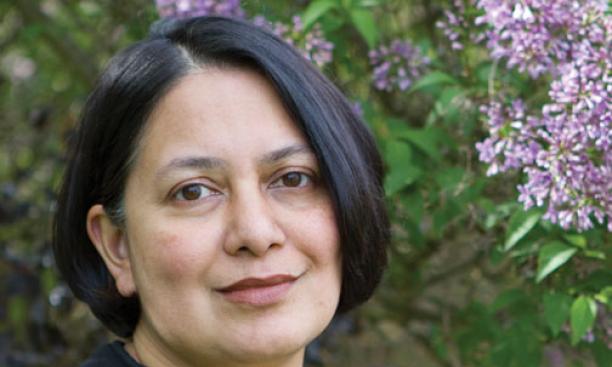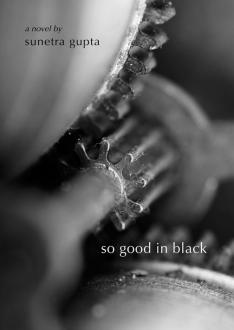

As a theoretical epidemiologist, Sunetra Gupta ’87 deals in mathematical models and papers written with the utmost clarity. On the zoology faculty at Oxford University, Gupta studies pathogens to understand how they spread and evolve, and how that evolution affects humans.
As an award-winning novelist, her narratives unfold sinuously, her characters and their choices revealed in poetic, stream-of-consciousness prose.
Gupta embraces both disciplines, driven by the same desire: “to make sense of the universe,” she says.
“When I’m doing science, every word I use must mean something very specific, and I must be very clear with my terms, whereas in literature there are ambiguities I want to mine.”
So Good in Black, Gupta’s fifth novel, explores gaps of friendship and memory. The characters move fluidly between the cultural shores of the United States, the United Kingdom, and India, as the author herself has done.
Published last spring by Clockroot Books, the story centers around Bankim “Byron” Mallick, a charming but cynical Bengali businessman accused of tainting baby formula sent to a women’s shelter, then of trying to save his reputation by arranging for the murder of the shelter’s founder. Among the coterie that gathers at Mallick’s side are Princetonian Max Gate, an American travel writer living in Britain, whose love for Ela Mukherjee, Mallick’s godchild, ruined Gate’s marriage.
Gate, the novel’s narrator, weaves past and present into his tale as he recalls emotionally charged histories — his own and those of other characters — and considers consequences of past decisions. His contradictory feelings about Mallick’s actions mirror readers’ questions of Mallick’s guilt or innocence.
What she’s reading now: John Banville’s Birchwood
What she likes about it: “the very distinctive way in which his prose combines the poetic with the analytical.”
Gupta explores morality, but she is not interested in absolutes. “There are people like Mallick you encounter who are playing by their own set of rules,” she says. “It’s hard to know when they are right or wrong, and they take advantage of our confusion with their charm. What’s important is they call you to question your own morality — that’s what happens to Max.”
A Calcutta native who lived several years in Africa, where her professor father taught history, Gupta was steeped in the works of Nobel laureate and Bengali poet Rabindranath Tagore and wrote fiction in Bengali throughout her childhood. She came to Princeton as a sophomore to major in physics. A course in animal behavior so captivated her that she switched to biology. In her senior year, she took a creative writing workshop with Joyce Carol Oates.
That led to Gupta writing her fiction in English instead of Bengali; the notice she has received includes being long-listed for the Orange Prize, the United Kingdom’s annual prize for fiction written by a woman.
Her scientific achievements are no less honored: Gupta has been a recipient of The Royal Society’s Rosiland Franklin Award, given annually to a woman for an outstanding contribution to science, technology, engineering, or mathematics.
Maria LoBiondo is an occasional writer for PAW.

